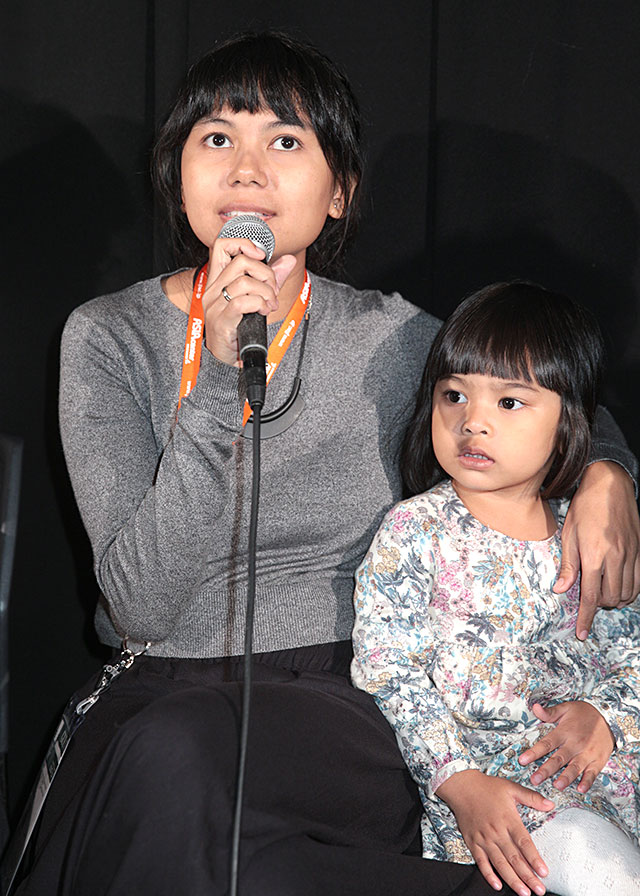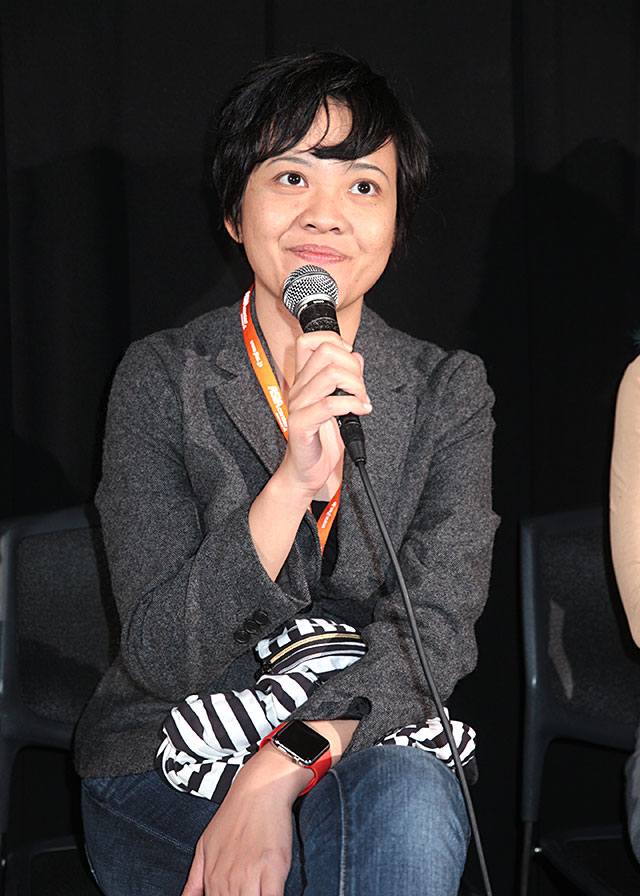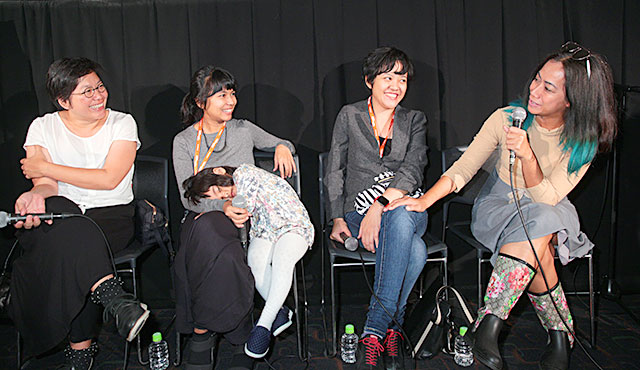Understanding and Support from Male Counterparts
Matsushita: Kamila, what do you think?
Kamila: Well, I am the youngest here, but I think the Indonesian film industry has always been open toward women whether it be toward female directors or other crew members. Historically speaking, we could say that Indonesian film was in a bit of a "coma," it was dormant. But it woke up after the Reformasi [Reformation] when it was the women who worked as film directors and filmmakers. I was in high school then, but I was brought up seeing female filmmakers like Nia, Mira Lesmana,*2 and Nan T. Achnas.*3 So, at least for me, it was the women who awakened Indonesian film from its sleep. Watching these women, I didn't need to question or doubt if I could make it in the industry; I didn't have to ask myself, "Is it possible for a woman to become a filmmaker or a director?" These women were already doing it.
*2 Producer known for films directed by Riri Riza. Founded MILES FILMS in 1995 and works on productions of rising filmmakers.
*3 Director. Her Bendera [The Flag] (2002) was screened in the Competition section of the 15th Tokyo International Film Festival in 2002. She is also known for directing documentary films.

Kamila: Of course, as Nia and Mouly said earlier, there are particular "social" roles we play. In the political sphere, Indonesia is open towards women: we have had female ministers and also presidents in the past. However, in terms of culture and/or religion, women still have a hard time stepping out of their single, stereotypical role and playing multiple roles in society―to be a wife, a mother, and also filmmaker, for instance.
In my case, I am very fortunate to have the support of my male family members; my father, father-in-law, and especially my husband have always encouraged me to follow my dreams. They know who I am and what I want to do. I think that all of us here have that support from the men in our lives, but there are still many women who are not as fortunate as we are and who have to live in Indonesia's strong patriarchal system.
Matsushita: Just as a footnote for the audience. Kamila's husband is the director, Ifa Isfansya, whose Catatan Dodol Calon Dokter [CADO CADO: Doctor 101] (2016) was screened at this year's Crosscut Asia. And also her father is the renowned director, Garin Nugroho. Mouly's husband is a scriptwriter too, so it is true that you are lucky to have the understanding of your family members. Meiske, what are your thoughts of women in society in Indonesia?
Meiske: Well, if I may go back to women in the film industry, I think the number is indeed increasing, especially in managerial positions like producers. There are also female DOPs (Director of Photography) but, as far as I know, the number is still very few. As Kamila mentioned in the beginning, women started the revolution for contemporary Indonesian cinema and it is growing more and more. So, I am actually hopeful for women and our future roles in the film industry.
Portraying What is Truly Real and Diverse
Matsushita: I'd like to open the discussion to the floor if anyone would like to ask a question.
Question: Hello. I am an Indonesian and I happened to watch Ms. Dinata's Three Sassy Sisters and Ms. Surya's What They Don't Talk About When They Talk About Love. As it was discussed, women have been depicted in Indonesian films as those who need to abide by particular social rules: they should cover their hair, they should dress this way, they should be like this or that et cetera. So when I watched the two movies, I was a little, well, shocked because the depiction of women, gender, and sexuality was, well, "Western." So I am curious: what were your goals in making those movies? Also, for whom did you make the films despite the wave toward conservatism and possibly controversy?

Mouly: The characters, especially the female ones, in my films are inspired and adapted from people I know in real life; I usually do that. Some people may find my depiction of women "Western," but that may just be because my perspective on sexuality and issues surrounding it is more liberal than theirs. In What They Don't Talk About When They Talk About Love, I take up the sexual relationship between two students, one visually-impaired and the other hearing-impaired. It may seem unlikely, but it is based on my research of something that actually happens; we just don't talk about it.
You said that I address controversial issues, and it is true that I take up sexuality frequently in my films. But, Indonesia is a country of over 250 million people. Why is that? If I can be frank, it's because people are having sex. We are just not talking about it; it is all "hush-hush" and swept under the rug. What I want to do in my films is to reflect reality; to not hide certain things just because it is considered socially controversial. It may make some Indonesians uncomfortable, but to portray Indonesia "as it is" is something that I pursue in my films.
Nia: If I may add. I think people sometimes forget the root of our culture. For example in ancient Indonesia temples, a lot of women were topless. And today, if you go to eastern parts of Indonesia, in the Flores Islands for instance where we shot Three Sassy Sisters, women wear the sarong*4 [Indonesian skirt] which is part of Indonesia's ancient culture untouched by the modernization of cities like Jakarta. It's like a skirt, but does that make it "Western"? No, it's actually very "Indonesian." Serat Centhini, one of the classics in Javanese literature, also addresses sex and sexuality in some of its pages. I mean, we are all sexual beings, otherwise we wouldn't have children and the population wouldn't have flourished like it is now.
*4 The sarong is a large length of fabric that is wrapped around the waist like a skirt and worn by men and women throughout the Indonesian archipelago.
Girls from Jakarta, Surabaya, and Bandung all go to Bali for holiday, for instance, and they walk around the streets in their bikinis. Yesterday, here, I was asked by those who had seen posters of Three Sassy Sisters, "Is this an Indonesian movie? I thought in Indonesia, everyone wore the hijab." My reply to them was, "I am from Indonesia and I don't wear the hijab." What you are saying are just stereotypes, an image broadcasted by the media. When you turn your eyes to reality, there are both: women who wear the hijab and women who don't.
As we discussed in the beginning, yes, we recognize there is now a force of conservatism over Indonesian women; we know that is the condition in society now. But I think film has the power to address what is neglected or shunned at in life―in "real" life. And that itself has the power to overcome some of the hypocrisies that lie in society. Film, I think, has the power to generate diversity and honesty.
Matsushita: On those wise words, I think we'd like to end the session. Please give a round of applause to the panelists, and thank you to the audience for joining us.

More Information
- A roundtable discussion between Meiske Taurisia, Kamila Andini, Mouly Surya, and Kenji Ishizaka (Program Director, TIFF) on gender and diversity in the Indonesian film industry is documented in the pamphlet for Crosscut Asia #03: Colorful Indonesia *Japanese only. The pamphlet is available for free at the Japan Foundation Library. Asako Fujioka, "Indonesian Women Filmmakers Talk about Indonesian Cinema," in Crosscut Asia #03: Colorful Indonesia (Tokyo: The Japan Foundation Asia Center, 40–44).
- A contributing article by Meiske Taurisia is in the Colorful Indonesia 2 Special Pamphlet *Japanese only also available for free at the Japan Foundation Library. Meiske Taurisia, "Film Diversity, Cultural Diversity," in Colorful Indonesia 2 (Tokyo: The Japan Foundation Asia Center, Athénée Français Cultural Center, 9).
- Watch the symposium footage here.
Meiske Taurisia (as Producer)
- Blind Pig Who Wants to Fly (2008) trailer
- Postcards from the Zoo (2012) trailer
- Someone's Wife in the Boat of Someone's Husband (2013) trailer
Kamila Andini
Mouly Surya
- Fikisi (2008) trailer
- What They Don't Talk About When They Talk About Love (2013) trailer
- Marlina the Murderer in Four Acts (2017) trailer
Nia Dinata
Interpreter: Kaori Tomita






